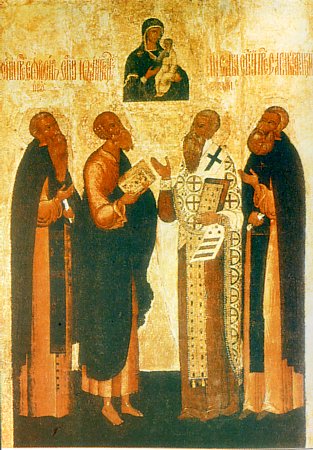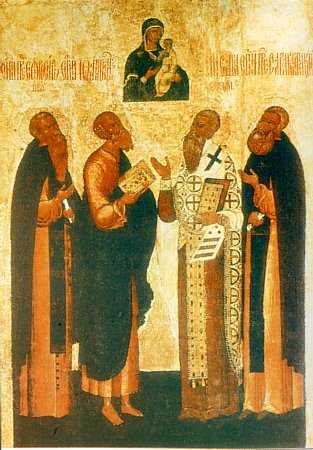
Saint Sava of Krypetsk was tonsured at Athos, and from there he came to Pskov. He began to struggle on Mount Snetna at the monastery of Mother of God near Pskov, and then he went to a more remote spot along the River Tolva, at the monastery of St Euphrosyne (May 15). Finally, he withdrew for complete solitude to the Krypetsk wilderness, 15 versts from the Tolva, and he settled alone in a small cave in the impenetrable forest.
His food was bread and water, and on Wednesdays and Fridays he ate nothing. Living the life of a hermit he was assailed by unclean spirits, but always he prevailed over them through prayer. After several years in the solitary life, those zealous for wilderness life began to gather around St Sava. They asked him to form a monastery and build a church in honor of the Apostle John the Theologian. The monk refused to be igumen of the monastery and entrusted its guidance to the monk Cassian. Many came out from Pskov to the austere Elder, and he healed and admonished them, but never did he accept gifts from them.
One time the Pskov prince Yaroslav Vasilievich Obolensky, who frequently visited at the monastery, journeyed with his sick wife to see the saint. St Sava sent him a message saying, "The Elder, the sinner Sava, tells you, Prince, not to enter the monastery with the princess. Our rule here states that women are not to enter the monastery. If you transgress this fatherly command, your princess will not receive healing."
The prince asked forgiveness, since it was through ignorance that he was on the point of violating the rule. St Sava came out through the monastery gates with the brethren, and served a Molieben there. The princess was healed. In 1487, through the mediation of the prince, Pskov received a deed to the lands for the monastery.
The monk taught the laity to guard their purity, reminding them of the injunction of the Apostle against the defilers of the body (I Cor. 6:9-10). He told the rich and the judges not to make their living at the expense of the poor and to preserve righteous truth. He frequently reminded everyone to avoid quarrels and enmity, to preserve love and peace and to overlook the faults of others by courtesy, even as they in turn have forgiven us.
At the monastery, a strict cenobitic life had been introduced from the very beginning. Then, when sufficient brethren and means had been gathered, there was nothing in the cell of the monk except for two icons, his monk's garb and the cot upon which he lay down to take his rest.
Through such poverty he taught the brethren. The monk commanded them to work the land with their own hands. He said, "How can we call the ancient ascetics our Fathers, when we do not live their way of life? How can we be counted as their children? They were homeless and poor, they spent their time in caves and in the wilderness, and for the Lord with all their strength they subjected their flesh to the spirit. They knew no respite by day, or by night. We should love the good Lord, children, and show our love for Him not only by words, nor by our manner of attire, but by deeds: by love one for another, by tears, by fasting, by every manner of temperance, just as the ancient Fathers did."
The grateful prince built a bridge to the monastery through the fens and the swamps 1400 sazhen [1 sazhen = 7 feet] in length. After his death (August 28, 1495), St Sava did not forsake the monastery, and many times came to its defense.
Once, robbers approached the monastery at night, and they saw an august Elder who held a staff in his hand and threateningly ordered them to repent. In the morning, they learned that there was no such Elder at the monastery, and they realized that it had been St Sava himself. The leader of the robbers repented before the igumen and remained at the monastery.
St Sava was tall of stature, with a beard grey as snow, roundish and thick and not very long. In this form he appeared to the monk Isaiah in the mid-sixteenth century, and showed him where to find his incorrupt relics. Later, in the year 1555, the Pskov priest Basil compiled the Life of St Sava at the request of the Krypetsk brethren, and his Feastday was established.
 Saint Sava of Krypetsk was tonsured at Athos, and from there he came to Pskov. He began to struggle on Mount Snetna at the monastery of Mother of God near Pskov, and then he went to a more remote spot along the River Tolva, at the monastery of St Euphrosyne (May 15). Finally, he withdrew for complete solitude to the Krypetsk wilderness, 15 versts from the Tolva, and he settled alone in a small cave in the impenetrable forest.
Saint Sava of Krypetsk was tonsured at Athos, and from there he came to Pskov. He began to struggle on Mount Snetna at the monastery of Mother of God near Pskov, and then he went to a more remote spot along the River Tolva, at the monastery of St Euphrosyne (May 15). Finally, he withdrew for complete solitude to the Krypetsk wilderness, 15 versts from the Tolva, and he settled alone in a small cave in the impenetrable forest.